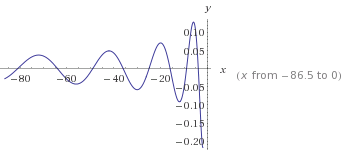Elegance Comes Only Periodically
 P
(
x
)
=
∫
−
x
2
0
(
n
=
1
∏
∞
n
2
n
2
+
t
)
d
t
P
(
x
)
=
∫
−
x
2
0
(
n
=
1
∏
∞
n
2
n
2
+
t
)
d
t
When x ∈ Z and P ( x ) = 0 , the value of P ( x ) can be expressed in the form π β α , where α is a perfect square and β is a prime number. Find α β .
This problem is original. The picture of the graph was produced by Wolfram .
The answer is 16.
This section requires Javascript.
You are seeing this because something didn't load right. We suggest you, (a) try
refreshing the page, (b) enabling javascript if it is disabled on your browser and,
finally, (c)
loading the
non-javascript version of this page
. We're sorry about the hassle.
1 solution
Hello, Mark. I thought saying P ( x ) besides zero would suffice, but I could see why that would be ambiguous. I just fixed it!
What I have written now is what I really meant to say.
Log in to reply
Yeah, it's fixed now. Interesting problem.
The question needs re-expressing. The integral is P ( x ) = ∫ − x 2 0 n = 1 ∏ ∞ ( 1 + n 2 t ) d t = 2 ∫ 0 x u n = 1 ∏ ∞ ( 1 − n 2 u 2 ) d u and hence P ( x ) = 2 ∫ 0 x u × π u sin π u d u = π 2 ∫ 0 x sin π u d u = π 2 2 ( 1 − cos π x ) . When x is an integer, this integral is either π 2 4 or zero.
The way the question is written, it wants P ( x ) to take the nonzero value for all integers x , which is not true. The question should either say "When x ∈ Z and P ( x ) = 0 ...", or else "When x ∈ Z is odd ... " to be accurate, and obtain the intended answer of 4 2 = 1 6 .